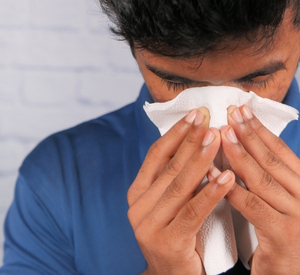
Seasonal allergies are upon us, and Wichita ranks #2 out of America’s most challenging places to live with seasonal allergies this year, according to the Asthma and Allergy Foundation of America (AAFA)*.
Pollen is the main culprit of seasonal allergies. Tree pollen produces the most pollen in the U.S., with the top months being March through May. Tree pollen combined with grass pollen will make for a super sneezy spring and summer for Wichita residents.
How We Can Help
At Mid-Kansas Ear, Nose & Throat, we offer allergy testing as well as allergy shots and to treat allergies. Allergy shots and drops are often also referred to as immunotherapy or allergy desensitization
- Allergy shots (allergy injections)
Allergy shots are made individually for each patient and administered by our specially trained allergy technicians. The shots are an injection that contains a small dose of the item(s) to which you are allergic. Allergy shots are administered once a week for several months; the duration needed will vary for each patient. - Allergy Drops
We also offer sublingual drop therapy. Allergy drops are painless and are an easy, convenient alternative to allergy shots. The drops can be taken at home, administered with a dropper bottle under the tongue. Drops and injections are mixed from the same extracts and are equally effective in the treatment in allergies.
NOTE: Sublingual drop therapy is not currently covered by any insurance companies, as it is not FDA approved.
When Will I Get Results?
Patients typically notice improvement of allergy symptoms by the time they reach their maintenance treatment level, which can be anywhere from a couple of weeks up to 12 months.
The goal of allergy injections and drops is to get your body to start producing blocking antibodies to your specific antigens, which in effect desensitizes the body to your offending allergens.
Each patient’s results will be different, and success greatly depends on remaining consistent with your treatments, controlling environmental factors, when possible, etc.
What Else Can I Do to Help Reduce Symptoms of Seasonal Allergies?
Here are some recommendations from the AAFA to help reduce contact with pollen and improve quality of life:
- Monitor pollen counts or forecasts daily and plan outdoor activities on days when pollen counts are likely to be lower.
- Keep windows closed during peak pollen times.
- Use central air conditioning or air cleaners with a CERTIFIED asthma & allergy friendly® filter and/or HEPA filtration
- Wear sunglasses, a mask and a hat (or other hair covering) when outdoors.
- Take a shower and wash your hair before going to bed.
- Change and wash clothes after outdoor activities.
- Dry clothes in a dryer or on a rack indoors, not on an outdoor line.
- Limit close contact with pets that spend a lot of time outdoors.
- Wipe pets off with a towel before they come inside.
- Remove your shoes before entering your home.
- Wash bedding in hot, soapy water once a week.
Give us a call at 316-684-2838 to make an appointment with one of our providers.
